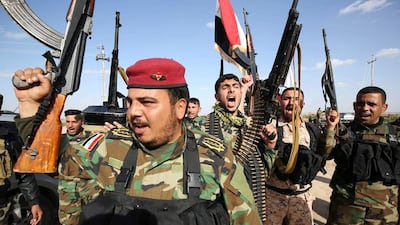KIRKUK // Shiite prayers billow from a mosque loudspeaker at a sprawling Iraqi military base on the fringes of Kirkuk as Shiite militiamen, most of them in mismatched military fatigues, shuttle back and forth to nearby front-lines, eager for a taste of victory against ISIL.
When the extremist militants blitzed across northern and western Iraq last year, tens of thousands of Shiite men answered a call-to-arms by the country's top Shiite cleric, Grand Ayatollah Ali Al Sistani, to defend the nation against the group.
Now the Shiite militiamen have arrived in Kirkuk, an oil-rich city in the north, which has long been one of Iraq's most hotly disputed territories. The militias have made a string of bases just 10 kilometres from the city their home. A marriage of convenience has since emerged with Iraq's strained Kurdish forces, which had been in charge of the city since last year when they repelled ISIL advances.
As they face a common enemy, the unexpected and often uncomfortable alliance between the Kurdish and Shiite rivals is on display. The friction is feeding the combustible inter-ethnic competition over who will ultimately get control of the city.
Kurdish forces claimed control of Kirkuk just days after ISIL swept across northern Iraq, seizing major cities, including Mosul and Tikrit. Kirkuk, located along the fluid line that separates Kurdish northern Iraq from the rest of the country, is home to Arabs, Kurds and Turkmen, and all have competing claims to the area. The Kurds have long wanted to incorporate the city into their semi-autonomous region, but Arabs and Turkmen oppose this.
In the last month, thousands of fighters from a handful of Shiite militias, officially known as the Popular Mobilisation Forces, have flooded into Kirkuk and the surrounding Tamim province. They include the powerful Iran-backed Badr Brigades.
Kirkuk Governor Najmaldin Karim welcomed the Shiite forces but Massoud Barzani, the president of the Kurdish regional government, insisted that the Shiite militiamen would be "prohibited under any circumstances" from entering the city.
"We are already in Kirkuk," said Mullah Mohammed Yousseff, a Badr Brigades spokesman, as he roared with laughter sat behind his desk at the Taza Batallion base.
"We have to fight," Mr Yousseff added. "Our religion legitimises it."
The Badr Brigades commander, Hadi Al Amiri, came to Kirkuk last week to deliver truckloads of weapons to Shiite fighters and vowed during a meeting with senior Kurdish officials to send thousands more. At least 2,000 fighters have arrived at the Taza base alone since the commander's visit. Several militia commanders in Kirkuk estimate that as many as 5,000 Shiite fighters arrived in the region this month.
"I'm here because ... Al Sistani called on us to protect our country," said 24-year-old Shiite fighter Amir Al Qassim, who came to Kirkuk from his native Baghdad in January.
A former minister in the Kurdish regional government, Jafar Moustafa, insisted that the reports of Shiite militia presence in Kirkuk are "far from reality".
But only a few kilometres away from where he spoke, religious Shiite flags mark the battlefield.
Less than 50 metres away, Kurdish fighters stood guard along the same front line.
Sunnis living in Kirkuk also have much at stake, and many are viewed with suspicion. The Shiite militias have been repeatedly accused of severe brutality against Sunni communities as they push ISIL back.
"They act like gangsters and we are afraid of that," said Yassin Ahmed, 24, a Sunni resident of Kirkuk. "But the most important thing is that they have to take care of the people and provide us with security."
*Associated Press

Iraq Shiite militias rush to defend Kirkuk from ISIL
Thousands of Shiite militiamen have arrived in Kirkuk, which has long been one of Iraq’s most hotly disputed territories.
Most popular today
